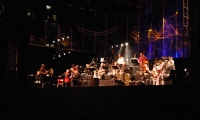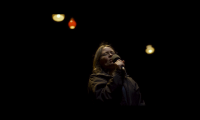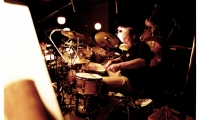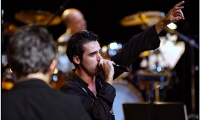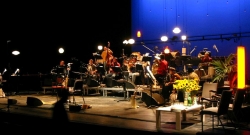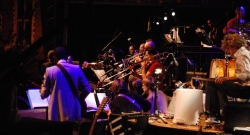CAST
Kris Dane & Judith Vindevogel : voices
Fabian Fiorini : conductor
Dirk Descheemaeker : clarinet, saxophone
Dirk Noyen : bassoon
Philippe Ranallo : trumpet
Michel Massot : tuba
Gerrit Nulens & Michaël Weilacher : drums and percussion
Jean-Luc Plouvier : piano, keyboard
Tom Pauwels et Eric E.T. : guitar, electric guitar, banjo
Ludo Mariën : accordion
Igor Semenoff : violin
Géry Cambier : double bass, e-bass
Tom Bruwier : lighting, stage
Jan Herinckx : stage manager
Alexandre Fostier : sound
songlist
(D) : arranged by François Deppe
(Fa) : arranged by Jean-Luc Fafchamps
(Fi) : arranged by Fabian Fiorini
- Lucky Day Overture (Tom Waits) (D)
- The Black Rider (Tom Waits) (D)
- Just the Right Bullets (Tom Waits) (Fi)
- t' aint't no sin (William Burroughs) (D)
- Way down in the hole (Tom Waits) (Fi)
- The briar and the rose (Tom Waits) (Fa)
- Barbara's Song (Kurt Weill / Bertold Brecht) (D)
- Polly's Lied (Kurt Weill / Bertold Brecht) (D)
- Surabaya Johnny (Kurt Weill / Bertold Brecht) (Fi)
- Die Moritat von Mackie Messer ((Kurt Weill / Bertold Brecht) (D)
- The Black Box Theme (Tom Waits) (D)
- Hang on Saint Christopher (Tom Waits) (Fi)
- Yesterday is here (Tom Waits) (Fi)
- Frank's Theme (Tom Waits) (Fa)
- Youkali (Kurt Weill / Roger Fernay) (Fa)
- Mahagonny Jenny (Kurt Weill / Bertold Brecht) (Fi)
- La Complainte de la Seine (Kurt Weill / Maurice Magre) (Fa)
- Alabama song (Kurt Weill / Bertold Brecht) (Fi)
- La Danse du Diable (Fabian Fiorini)
- My Ship (Kurt Weill / Moss Hart) (Fa)
TOUR
4.5.2002: WAITS/WEILL (première)
Concertgebouw, Bruges. Brugge2002/American Air (B)
1.6.2002: WAITS/WEILL
Maison de la Culture d’Amiens (F)
28.9.2002: WAITS/WEILL
Festival Musica, Strasbourg (F)
7.11.2002: WAITS/WEILL
Reims, Le Manège (F)
7.12.2002: WAITS/WEILL
Kaaitheater, Bruxelles
31.12.2003: WAITS/WEILL
Happy New Year, Opéra de Lille (F)
20.1.2003 : WAITS/WEILL
Clermont-Ferrand (FR)
18.5.2004 : WAITS/WEILL
Opera Leonard de Vinci, Rouen (FR)
21 & 22.5.2004 : WAITS/WEILL
National Theatre, Bergen (Norway)
30.5.2004: WAITS/WEILL
Festival Perspectives, Saarbrücken (D)
9.6.2004 : WAITS/WEILL
Grand Théâtre du Luxembourg (L)
12.6.2004: WAITS/WEILL
Cité de la Musique, Paris (F)
22.3.2005: WAITS/WEILL
Tongyeong Festival, Tongyeong (Korea)
19.7.2005: WAITS/WEILL
Festival de Marseille, Marseille (F)
8.9.2005: WAITS/WEILL
Settembre Musicale, Torino (I)
16.9.2005: WAITS/WEILL
Kursaal, Oostende (B)
6.12.2005: WAITS/WEILL
MC2 - Maison de la Culture, Grenoble (F)
24.8.2007 : WAITS/WEILL
Groningen
31.8.2007 : WAITS/WEILL
Middelburg
21.9.2007 : WAITS/WEILL
Kortrijk
29.9.2007 : WAITS/WEILL
Handelsbeurs, Gent
23.10.2007 : WAITS/WEILL
Brussels
24.11.2008: WAITS/WEIL
Cultureel Centrum Hasselt (B)
28+29.11.2008: WAITS/WEILL
Auditorium/Le Duo, Dijon (F)
02.02.2010: WAITS-WEILL
Muziekgebouw, Amsterdam (NL)
Kris Dane
Judith Vindevogel ©Eric Verberdt
Gerrit Nulens
Korean television !
Jean-Luc Plouvier
Michael Weilacher, Michel Massot
Kris Dane
Philippe Ranallo
Tom Waits has written two operas, one of them (The Black Rider) with William Burroughs. They are operas about beggars and thieves, traumatic from start to finish. We shall present some of his ‘arias’ in concert, sung by the blues singer Kris Dane, to reveal the kinship and contrasts with the operas of Weill during his German period (but without any fetishist fascination for the Weimar caßbarets) and his American period (Weill’s true cursed works, that is, his unjustifiable Hollywood slows). Vocals: Judith Vindevogel.
Tom Waits puts the Berlin composer in perspective. There is the same genius of subtly asymmetrical melody, the same troubling sense of being off in the harmony, and the same way of using the three themes of popular song: revolt, love song, and drunkenness. Weill incarnates this facet of modernity, which refuses to reconsider its foundations, marvellously well, and contents himself with laying them down askew. It’s diagonal poetry that talks about limping lives and unravelled love. We haven’t the heart, we haven’t the time to grapple with great art head on.
This project involved two arrangement exercises. First came the free transcription of Waits’ instrumental scores (semi-improvised on the CD), and then the reduction (which was just as free) of Weill’s orchestra scores for a chamber ensemble. Three Belgian composers - François Deppe, Fabian Fiorini, and Jean-Luc Fafchamps - dipped their pens in this most Saturnine ink.
Excerpt from a press review
In their work, the arrangers have respected both the anarchic nature of Waits’ songs and Kurt Weill’s acerbic tone. But the true challenge is in the singer’s rendering. This challenge was taken up by Judith Vindevogel, who proved to be a phenomenal singer of Weill’s music. Her broad expressive palette - she is as much at ease in the lyrical legato as in the ironic parlando - gave Kurt Weill’s best-known airs (such as in Sabaya Johnny or, more particularly, in Seeräuber-Jenny) a most incredibly powerful impact. The rock singer Kris Dane had the ungrateful task of making us forget Tom Waits’ inimitable sand-paper voice. He carried this off quite well by at times singing into the microphone and a megaphone simultaneously, which gave his voice all the cutting edge that it required. Backed up by a wild ensemble, Dane proposed a rendering that Waits would without a doubt have approved of. His version of ‘ I’ll Shoot the Moon’ is even better than the original, in my opinion.
(Maarten Beirens, De Standaard, May 6th, 2002)
Tom Waits heeft twee opera’s geschreven, waaruit Ictus “concertaria’s” voorstelt. Deze herlezing is toevertrouwd aan Kris Dane, een andere “bluesman”, die totaal verschillend is maar ook in staat is om zijn stijl op te dringen. Als verwante en contrasterende tegenhanger van Waits, zijn er opera-fragmenten van Kurt Weill, uit zijn Duitse en uit zijn Amerikaanse periode, gebracht door Judith Vindevogel.
De Amerikaanse blueszanger plaatst de Berlijnse componist in perspectief: eenzelfde melodisch genie, eenzelfde gevoel voor verontrustende afwijkingen in de harmonie en dezelfde manier om de drie hoofdthema’s van de populaire zang te benutten: revolte, de amoureuze klaagzang en de dronkenschap.
Op een bewonderenswaardige manier belichaamt Weill deze versie van de moderniteit, die er niet op uit is om de basiselementen opnieuw te definiëren, maar zich tevreden stelt met ze op een dwarse manier te gebruiken. Het gaat om een diagonale poëzie, die spreekt over mank gelopen levens, verloren liefdes; ze heeft noch het hart, noch de tijd om de grote kunst frontaal aan te vallen
Voor dit project moesten twee bewerkingen worden gemaakt: de instrumentale partijen van Waits, die op de plaat gedeeltelijk geïmproviseerd zijn, moesten getranscribeerd worden, en de orkestrale partituren van Weill moesten bewerkt worden voor kamermuziekensemble. Een goede gelegenheid om Belgische componisten die hun vak kennen in te zetten (François Deppe, Fabian Fiorini, Jean-Luc Fafchamps).
Persknipsel _ (Maarten Beirens, De Standaard, 6 mei 2002)
De nieuwe arrangementen (door François Deppe, Jean-Luc Fafchamps en Fabian Fiorini) respecteerden het anarchistische karakter van de songs van Waits en de bijtende toon van Weill. Maar de echte uitdaging lag in de zang, waar zangeres Judith Vindevogelzich een fenomenale Weill-vertolkster toonde. Haar brede expressieve palet van hoge uithalen tot wrang parlando gaf zelfs de bekendste Weill-nummers als ,,Surabaya Johnny'' en vooral ,,Seeräuber-Jenny'' een verrassend sterke impact.
Rockzanger Kris Dane had de ondankbare taak om het schuurpapieren timbre en onnavolgbare idioom van Tom Waits te doen vergeten in songs uit Franks wild years en The black rider. Dat lukte hem best, al dan niet geholpen door de vondst om tegelijk in een micro en een megafoon te zingen. Het gaf zijn stem het nodige scherpe randje.
Geruggensteund door een ontketend Ictus Ensemble zette Dane deze nummers zo neer dat Tom Waits er ongetwijfeld trots op zou zijn geweest. In ,,I'll shoot the moon'' overtrof Dane naar mijn mening zelfs het origineel.
Tom Waits a écrit deux opéras, dont l’un avec William Burroughs. Opéras de la cour des miracles, traumatiques de bout en bout. Ictus en présente des "arias" de concert, avec le bluesman américo-belge Kris Dane.
Filiation et contraste avec des airs des opéras de Weill, période allemande (mais sans fascination fétichiste pour le «cabaret de Weimar») et période américaine (les vraies oeuvres maudites de Weill : ses injustifiables slows hollywoodiens). Au chant : Judith Vindevogel.
Le bluesman américain y met en perspective le compositeur berlinois : même génie mélodique subtilement assymétrique, même sens du décalage troublant dans l’harmonie, et même façon d’exploiter les trois thèmes de la vocalité populaire : révolte, plainte amoureuse, ivresse. Weill incarne à merveille ce versant de la modernité qui se refuse à reconsidérer les fondations, et se contente de les disposer de travers. C’est une poésie diagonale, elle parle de vies boîteuses et d’amours défaits : on n’a pas le coeur, on n’a pas le temps, d’y attaquer frontalement le grand art.
Pris en charge par les trois mêmes arrangeurs, lesquels ont écrit pour le même “big band” en trempant leur plume dans l'encre la plus saturnienne, les deux compositeurs se retrouvent face à face sur le même territoire, légèrement exilés de leurs terres natales. Territoire inédit fait de blues, de musique contemporaine, de rock alternatif et de muzak.
Il n’y a pas d’histoire, il y a un moment : c’est une minute avant. Avant la catastrophe, avant que l’élégant dandy ne s’écroule sous l’effet de sa cirrhose, avant que la charmante enfant ne jette son bébé à la Seine, avant que l’impeccable capitaine ne déclenche le carnage, avant que le paquebot ne coule. Tout cela très soigné, très mélodique, très dansant. Très digne.
